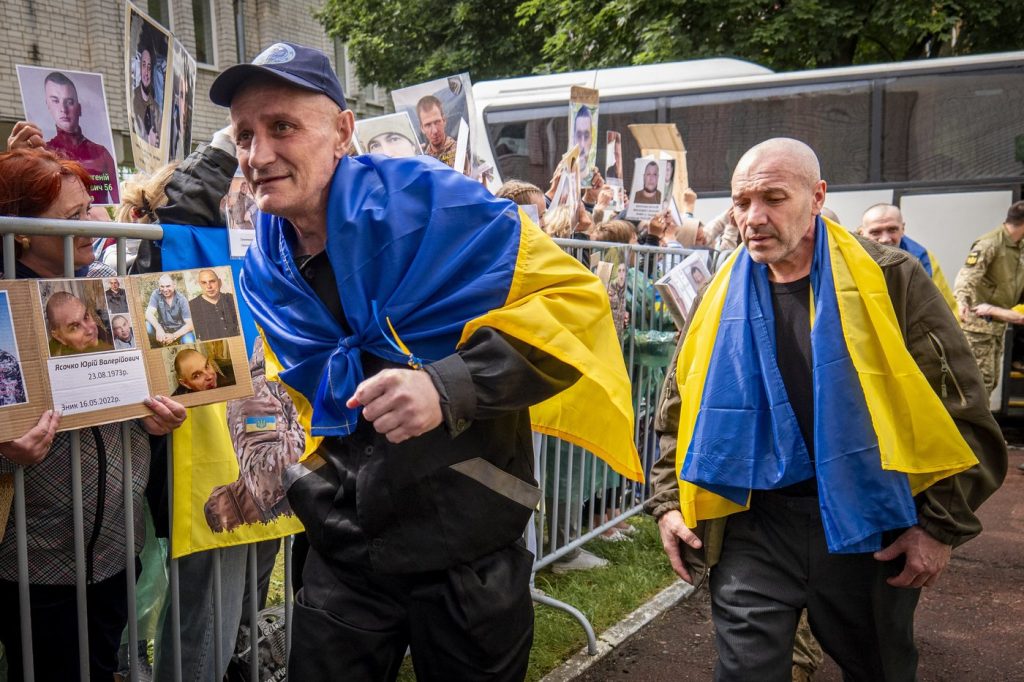KYIV, Ukraine (AP) – President Volodymyr Zelenskyy announced that recent exchanges with Russia have led to the repatriation of at least 20 dead Russian soldiers. He characterized this development as indicative of Moscow's disorganization in conducting larger swaps of wounded prisoners of war (POWs) and the remains of fallen troops. During a press briefing, which took place on Friday but was under embargo until Saturday, Zelenskyy noted that among the bodies Ukraine received was an Israeli citizen. The identities of the deceased were not disclosed by officials.
Zelenskyy remarked, “They threw the corpses of their citizens at us. This is their attitude toward war, toward their soldiers. And this is already documented. Sometimes these bodies even have Russian passports.” He reported that the Russian side maintained that all the deceased were Ukrainian. During the briefing, journalists were presented with a Russian passport belonging to one of the 20 dead Russians, which indicated that he was from the Moscow region.
The exchange of dead and wounded soldiers has been the only significant outcome of recent peace talks held in Istanbul. Last June, Ukraine and Russia agreed on a swap format of 6,000 bodies in total during the second round of negotiations, although Zelenskyy expressed concerns about the high number and the limited time available for forensic examinations.
Zelenskyy expressed skepticism regarding Russian President Vladimir Putin’s genuine intentions for peace. He suggested that Russia's tactical engagement in peace talks may be aimed at appeasing the U.S. and avoiding further sanctions, all while continuing what Putin perceives as a winning war effort. This could place Ukraine in a challenging position regarding the continuation of discussions in Istanbul.
Addressing the broader geopolitical context, Zelenskyy condemned Iran's pursuit of nuclear weapons, emphasizing its military partnership with Russia, though he refrained from overtly supporting Israel’s military actions. The conflict in the Middle East, he indicated, would have indirect repercussions for Ukraine. “Iran gave the Russians everything to kill us. They provided martyrs, missiles, and licenses,” Zelenskyy asserted. He highlighted that the weakening of Iran's military production capacities might be beneficial for Ukraine, but he cautioned that it could also become too late to capitalize on these changes.
Zelenskyy discussed the ramifications of Russian military reliance on Iranian technology, including the modification of Iranian-made Shahed drones, which have been deployed in mass attacks against Ukraine. He also mentioned that 39 Russian companies are involved in the production of the Oreshnik missile, capable of carrying a nuclear warhead, with 21 of those companies not currently under sanctions. He criticized the lack of urgent sanctions against these firms.
On the home front, Zelenskyy reaffirmed that reports of the destruction of Patriot air defense systems during Russian drone attacks were false. He stated that Ukraine has begun utilizing domestically produced interceptors to counter Shahed drones and is seeking financial support from Germany to enhance the production of these munitions. Furthermore, he disclosed that he has reached out to Western allies to consider allocating 0.25% of their GDP to support Ukraine's defense industry.
Zelenskyy indicated the likelihood of attending an upcoming NATO summit, with a final decision to be made shortly. Although he did not meet with former U.S. President Donald Trump, key Ukrainian officials presented U.S. Treasury Secretary Scott Bessent with a list of weaponry they are interested in acquiring, including Patriot systems. He emphasized the necessity for a renewed diplomatic approach and increased international pressure on Putin during future discussions.
For ongoing coverage of the war in Ukraine, follow the dedicated news hub at AP News.











